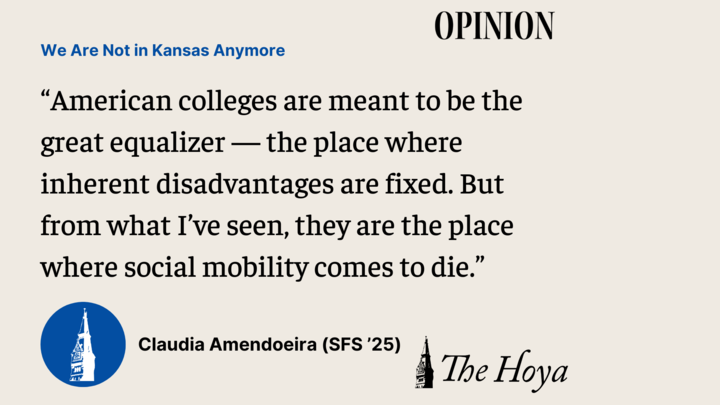My high school did not have a guidance counselor, but that didn’t stop me. I bought an SAT prep book on Amazon and religiously studied “How to Get Into Georgetown” YouTube videos. During my last years of schooling in Portugal, only one thing mattered: securing a place on an American campus. All I wanted was to walk around with the golden stamp of an American higher education.
After two and a half years at Georgetown University, much has shown me that the rest of the world has a distorted view of the United States. Not everything is as it seems. Beneath the glitz and glamor of the “American Dream” is an infinitely complicated society that, in many ways, makes that dream nothing but a myth.
Yet millions of international students still fight to come to America, willing to accept things that would immediately blacklist other countries: daily HOYAlerts about violent incidents, endless hours waiting for medical emergencies and paying $7 for a latte.
My friends and I often ponder upon what makes it all worthwhile. We ask why we traveled thousands of miles away from our families and friends, trying to assimilate to an unfamiliar culture, only to be deported a year after graduation when our student visas expire. We wonder if the price is too high to pay.
These were not questions I entertained when I was an applicant. It would be impossible to exaggerate the mythical magnitude American colleges had in my mind. Elite institutions like Harvard and Stanford seemed to be the beating heart of the country, the place where all ideas began and flourished, where professors and fellow students endlessly opened and shaped young minds.
But at some point along the way, there was a shift. American colleges have faced a number of acid tests in the previous years — most of which they failed. The 2019 Varsity Blues scandal showed how money can easily open the back door to any elite college, allowing the children of wealthy parents to steal spots from less privileged, more diligent ones. Last year, the Supreme Court deemed affirmative action unconstitutional — while legacy admissions, a practice giving an unfair advantage to primarily white and wealthy children, is still up and running at many institutions, Georgetown included.
These developments undoubtedly revealed the unfairness of the American higher education system. But perhaps they rippled so strongly throughout the country because they revealed something deeper: That the whole American system of meritocracy is a myth. American colleges are meant to be the great equalizer — the place where inherent disadvantages are fixed. But from what I’ve seen, they are the place where social mobility comes to die.
But the question currently is not only whether the system works for everyone, but whether it works at all. Beyond its ability to deliver on its promises of being a place to facilitate social mobility, I wonder whether our education system is even making us smarter. Some of the extreme reactions to the Israel-Hamas war displayed on our college campus made my father — who was always the biggest proponent of me going to the United States for college — wonder the same thing, calling me to check what I was learning in classes and hearing from my professors and peers.
We are meant to be thinking every day — but only about the right things, the polite things, the uncontroversial things. “Thinking outside the box” is often a mortal crime. In the era of performative politics, there are two rights under threat: the right to speak and the right to stay quiet.
Anyone who was surprised by three university presidents’ refusal to label calls for the genocide of the Jewish people as bullying or harassment has been blind to this existential shift. Indeed, the downfall of these presidents is a sad metaphor for the downfall of their respective institutions. Rep. Elise Stefanik (R-N.Y.) asked the university presidents a moral question, and Americans were furious with their responses — just like they are furious with their elite colleges’ inability to facilitate justice, equality and progress.
That seems to be the crux of why incidents on college campuses appear to be attacks on the American soul: We have turned elite institutions from places where we learn ideas into places where we learn morality. American colleges are mirrors of society. I wonder if this is the way it should be — I’m not entirely convinced that it’s natural for colleges to be America’s moral compasses.
I do not necessarily hold pessimistic answers to all these questions, and if I had to choose today, I would go to Georgetown all over again. Despite all I’ve written, Georgetown is still the place where my mind has been opened more than ever and where I have made the friends who became family.
But I suppose my point is that I never had so many questions either. Maybe the sole fact that I hold these doubts — that I am now capable of thinking critically on a topic that I previously placed beyond judgment — is an ode to my education. Maybe I will accept this narrative — this four-year degree better be worth it, since it ain’t cheap.
Claudia Amendoeira is a junior in the School of Foreign Service. This is the first installment of her column “We Are Not in Kansas Anymore: Life in America Through the Eyes of an International Student.”




















